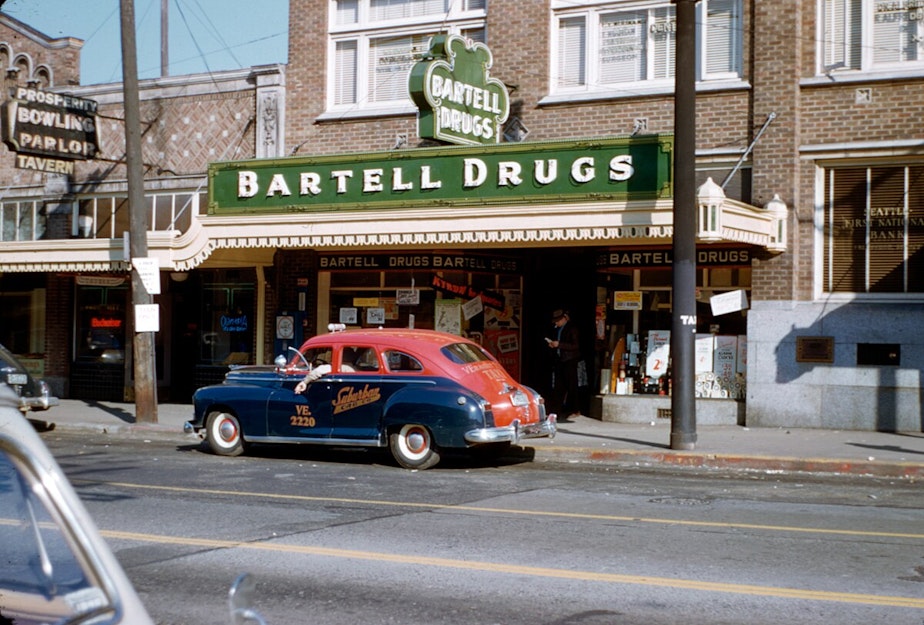Seattle’s 135-year-old ‘irrational’ love affair with Bartell Drugs draws to a sad close

We learned recently that all of the remaining Bartell Drugs stores will close this year unless Rite Aid finds a buyer.
KUOW’s Kim Malcolm reached out to local historian Feliks Banel to mark the sad final chapter of a remarkable business story. They talked about what led to the moment in 1890 when 22-year-old pharmacist George H. Bartell Sr. bought a drug store in Seattle, and what happened next.
This interview has been edited for clarity.
Kim Malcolm: I read that George Bartell left home when he was just 14 years old. He went to Lincoln, Kansas, and found work doing odd jobs in a drug store. Here's how he recalled his start later on:
“A friend of mine advised me to enter the drug business when I was very young, and I got acquainted with the president of the state pharmaceutical association, and he took me under his wing.”
That’s a recording of Bartell from a 1997 documentary by Seattle filmmaker Stephen Sadis. Young George apprentices with a pharmacist, he gets his license, and then he decides to go west. What happened next?
Feliks Banel: Many people were heading west in those days, in the late 19th century. He makes his way to this little place called Seattle. The population had been growing like crazy. In the 1880s, Seattle went from 4,000 people, one of the smaller towns in the state, to 40,000 people by the 1890s. He gets a job at a little drug store down on Jackson, in the Central Area. Within a few weeks, that owner sells the store to him. He's in business, running a drug store.
Sponsored
How does that happen, in just a couple of weeks?
I think that's just the way things were in that day. Things were growing so quickly. Seattle was rapidly expanding. There's so much opportunity, and he knew his way around a drugstore. Most of the 1890s, he runs that one store. He gets dazzled by the gold rush and heads off to the gold fields. He hands off to a friend to run the store for a while. He doesn't find any gold. He figures while he's up there in Alaska, ‘I'm going to come back and really focus on the drugstore business.’
By 1900, Seattle now has 80,000 people. By 1910 it has something like 240,000 people. It's just growing like topsy, and so pretty much any business probably could have survived. He picked a really smart time to grow an expanding business.
What made Bartell stand out?
That's a really good question, because other than the fact that they continued to grow and they were smart about where they chose to open locations, there were lots of other drug stores. G.O. Guy was a big Seattle store that nobody remembers anymore. They did focus on local products. They sold apples, and Almond Roca, and they sold those Mountain Bars from Tacoma, Brown and Haley. They’re kind of an acquired taste. It’s like this big, coarse lump of chocolate. And I love them. They're great. And they're weird flavors. But I don't know where to buy those anymore, since my Bartell's went away.
Sponsored
They were doing local before this whole kind of hyper-local focus of the last 10 or 20 years, and kind of the anti-corporate thing. They were doing it because it made sense. They made good choices as they expanded and contracted over the decades into the 20th century. They were sometimes the exception. A family-run business, oftentimes, the second generation or third generation drives it into the ground. That didn't happen with Bartell’s.
My fantasy is that somehow the last little bits of the chain would be bought again by the Bartell family. If I had to write the screenplay, George Bartell the fourth or the fifth would buy one of the remaining stores and grow it gradually. Start with just one, bring in the Aplets and Cotlets, and the Mountain Bars.
It's almost irrational, how much people love Bartell’s. Thinking about this story, and going through all the Bartell’s notes of the last five years, since they announced the sale to Rite Aid, it's been much more traumatic than I thought it was going to be. It's just a really sad time for what it means to Seattle and that kind of retail. It's commerce, it's capitalism, but it's the community part of it that just makes it so special.
Listen to the interview by clicking the play button above.
EDITOR'S NOTE: This article was amended on May 16 to clarify that all Bartell Drug stores will close, if Rite Aid does not find a buyer.





